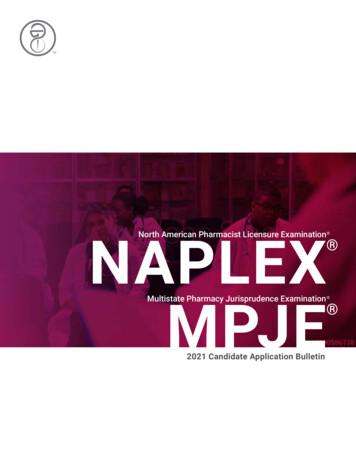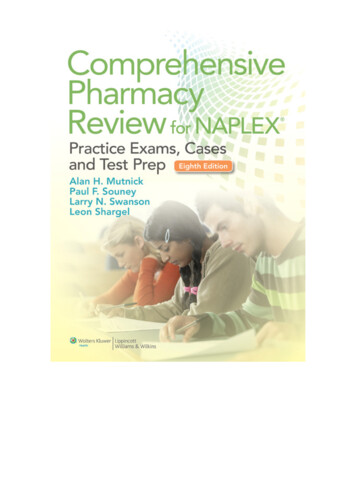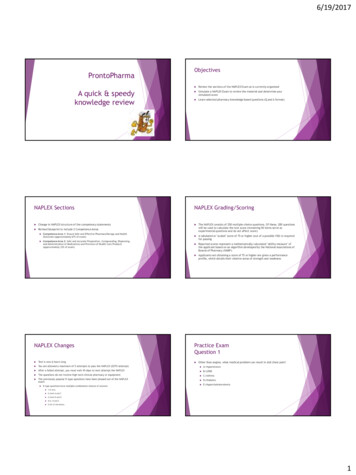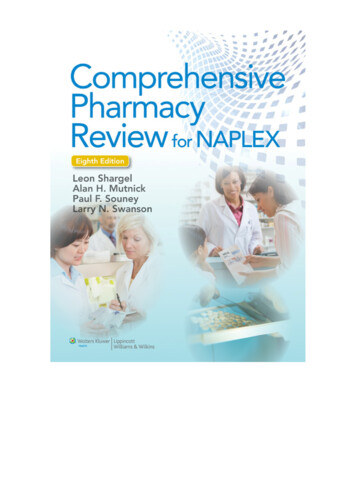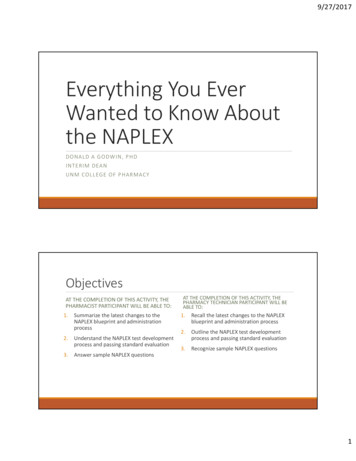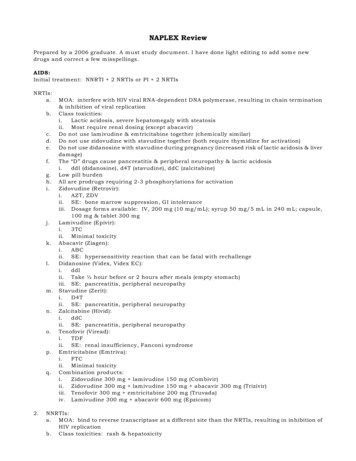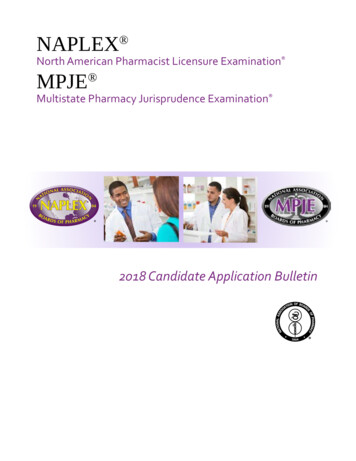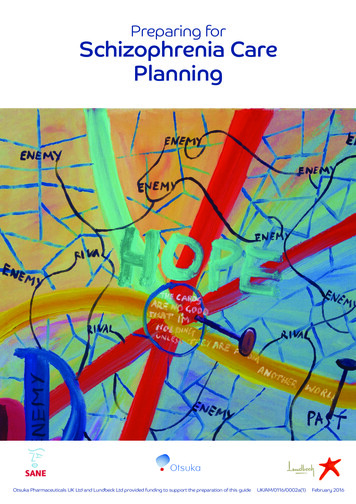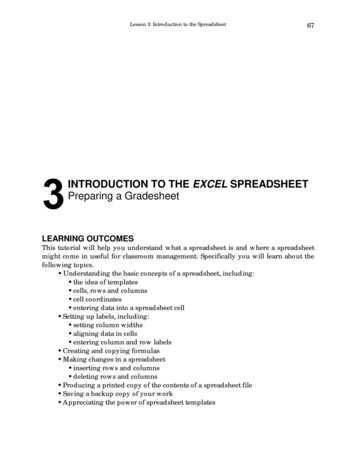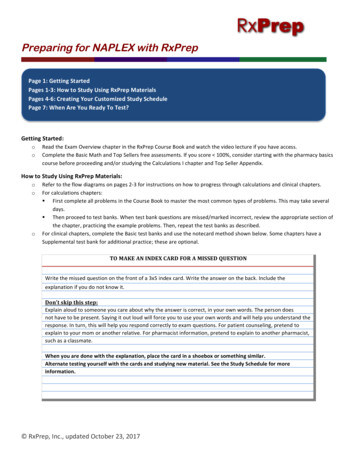
Transcription
Preparing for NAPLEX with RxPrepPage 1: Getting StartedPages 1-3: How to Study Using RxPrep MaterialsPages 4-6: Creating Your Customized Study SchedulePage 7: When Are You Ready To Test?Getting Started:ooRead the Exam Overview chapter in the RxPrep Course Book and watch the video lecture if you have access.Complete the Basic Math and Top Sellers free assessments. If you score 100%, consider starting with the pharmacy basicscourse before proceeding and/or studying the Calculations I chapter and Top Seller Appendix.How to Study Using RxPrep Materials:oooRefer to the flow diagrams on pages 2-3 for instructions on how to progress through calculations and clinical chapters.For calculations chapters:§ First complete all problems in the Course Book to master the most common types of problems. This may take severaldays.§ Then proceed to test banks. When test bank questions are missed/marked incorrect, review the appropriate section ofthe chapter, practicing the example problems. Then, repeat the test banks as described.For clinical chapters, complete the Basic test banks and use the notecard method shown below. Some chapters have aSupplemental test bank for additional practice; these are optional.TO MAKE AN INDEX CARD FOR A MISSED QUESTIONWrite the missed question on the front of a 3x5 index card. Write the answer on the back. Include theexplanation if you do not know it.Don’t skip this step:Explain aloud to someone you care about why the answer is correct, in your own words. The person doesnot have to be present. Saying it out loud will force you to use your own words and will help you understand theresponse. In turn, this will help you respond correctly to exam questions. For patient counseling, pretend toexplain to your mom or another relative. For pharmacist information, pretend to explain to another pharmacist,such as a classmate.When you are done with the explanation, place the card in a shoebox or something similar.Alternate testing yourself with the cards and studying new material. See the Study Schedule for moreinformation. RxPrep, Inc., updated October 23, 2017
RxPrep, Inc., updated October 23, 20172
RxPrep, Inc., updated October 23, 20173
Creating Your Customized Study ScheduleooooIf you already have a test date (or target test date), mark it on the calendar. Count how many days are available betweennow and the test date.Mark a date 2 weeks before your test date and write “RXPREP PRACTICE EXAM” on that date. This is the day you shouldplan to take the RxPrep Practice Exam (a NAPLEX-Style exam) which will assess your readiness to test (target score 80%).Go through each day of your calendar and block out time slots on each day for RxPrep NAPLEX studying.Once you have determined the total number of hours available, assign hours to each topic (see estimates below). It isrecommended that non-calculations/clinical topics alternate with calculations topics (take 60% of the hours and assignthem to non-calculations/clinical topics to coincide with NAPLEX Competency Statement breakdown).th§ Example: You estimate 2 hrs of study per weekday and 8 hours per weekend between now and May 19 (2 weeksbefore your target test date): total number of hours available 216 hours.§ Dedicate 130 hrs (60% of 216) for non-calculations/clinical topics; this is approximately 1.8 hours per topic if dividedevenly, however some topics may be quicker than others (see estimates below). Order of topics is not critical. Scheduletopics to match APPEs or alternate between topics that are harder and easier for you (to stay motivated).Time Dedicated to Non-Calculations/Clinical TopicsUse this guide when selecting topics and assigning them to your study calendar. The completion times are general estimates basedon the number of pages in the chapter and the number of questions in the test bank(s) associated with the chapter. It does notaccount for time needed to make notecards. Hours assigned can be adjusted according to your baseline knowledge of the topic areaand the total number of study hours available prior to testing. Assign all topics to your study schedule.Completion time:0.5-1.5 hoursHandling hazardous drugsDrug allergies & adverse drug reactionsPharmacogenomicsDrug mechanisms, classes & structuresDrug formulationsDrug referencesInterpreting questions from patient casesIV drug compatibility, administration & degradationEmergency preparedness, toxicology & antidotesDrug use in pregnancy & lactationPediatric conditionsTravelersInfectious diseases IVPulmonary arterial hypertensionAllergic rhinitis, cough & coldChronic obstructive pulmonary diseaseTobacco cessationCystic fibrosisThyroid disordersMigraineGoutIschemic heart diseaseAnemiaSickle cell diseaseBipolar disorderParkinson diseaseAlzheimer’s diseaseAnxiety disordersStrokeConstipation & diarrheaSexual dysfunctionBenign prostatic hypertrophyOveractive bladderGlaucoma, ophthalmics & oticsMotion sicknessWeight lossCompletion time:1.5-3 hoursNon-sterile compoundingSterile compoundingMedication safety & quality improvementPharmacokineticsDrug interactionsDietary supplements, natural & complementarymedicineLab values & drug monitoringCritical care & fluids/electrolytesImmunizationsRenal diseaseHepatitis & liver diseaseInfectious diseases IIInfectious diseases IIIAsthmaTransplantContraception & infertilityHypertensionAcute coronary syndromesChronic heart sAttention deficit hyperactivity disorderGERD & PUDInflammatory bowel disease RxPrep, Inc., updated October 23, 2017Completion time: 3 hoursBiostatistics & pharmacoeconomicsInfectious diseases IHuman immunodeficiency virusDiabetesSystemic steroids & autoimmune conditionsOsteoporosis, menopause & testosterone usePainDyslipidemiaAnticoagulationOncology I and IIEpilepsy/seizuresCommon skin conditions4
RxPrep Sample NAPLEX Study Schedule: FOR THOSE ON APPE ROTATIONS S8-5pmAPPEReview notecards on lunch & breaks.APPEReview notecards on lunch & breaks.5-6pmDinner/CommuteDinner/Commute6-7pmAPPE AssignmentsAPPE AssignmentsBreakBreak7-7:15pm7:15-8:15pmClinical 0pm10-10:15pmCritical Care (chapter /- video)Clinical TopicCritical Care (test bank)BreakPick up where you left offCalculationsPick up where you left offReview NotecardsReview NotecardsReview calendar for tomorrow. Make to-do list.Review calendar for tomorrow. Make to-do pmAPPEReview notecards on lunch & breaks.APPEReview notecards on lunch & breaks.5-6pmDinner/CommuteDinner/Commute6-7pmAPPE AssignmentsAPPE AssignmentsBreakBreak7-7:15pm7:15-8:15pmClinical 0pm10-10:15pmDrug Allergies (chapter, video & test bank)Clinical TopicHepatitis (chapter /- video)BreakPick up where you left offCalculationsPick up where you left offReview NotecardsReview NotecardsReview calendar for tomorrow. Make to-do list.Review calendar for tomorrow. Make to-do pmAPPEReview notecards on lunch & breaks.5-6pmDinner/CommuteUse 8-hr study schedule (from Full-Time Study Schedule) forSaturday and/or Sunday. Weekend can be used to catch up on topicsthat take longer than you expected or to cover additional topics.6-7pmAPPE Assignments7-7:15pmBreak7:15-8:15pmClinical 0pm10-10:15pmNOTESHepatitis (test bank)Pick up where you left offReview NotecardsReview calendar for tomorrow. Make to-do list.Chapter read chapter and study content (learn bolded drugs and underlined content first) /- video as needed or desired.Test bank complete test bank and make notecards for missed questions. RxPrep, Inc., updated October 23, 20175
RxPrep Sample NAPLEX Study Schedule: FOR FULL-TIME STUDY (8 SClinical TopicInfectious Diseases I (chapter /- video)Clinical TopicAsthma (chapter /- video)BreakCalculationsClinical tious Diseases I (chapter /- video)Pick up where you left offClinical TopicAsthma (test bank)LunchPick up where you left offCalculationsPick up where you left offBreakInfectious Diseases I (test bank)Clinical TopicAsthma (test bank) / Stroke (all)BreakPick up where you left offDinner/Free TimeClinical TopicCalculationsBreakBreak3:15-3:30pm8-8:15pmPick up where you left offLunchClinical ulationsPick up where you left offDinner/Free TimeInfectious Diseases I (test bank)Clinical TopicTobacco Cessation (all)BreakBreak8:15-9:15pmReview NotecardsReview Notecards9:15-9:30pmReview calendar for tomorrow. Make to-do list.Review calendar for tomorrow. Make to-do ITYNOTESClinical TopicInfectious Disease II (chapter /- video)Clinical TopicIschemic Heart Disease (all)BreakCalculationsClinical TopicCalculationsInfectious Disease II (test bank)Break3:30-4:30pmCalculationsPick up where you left offClinical TopicDyslipidemia (chapter /- video)CalculationsPick up where you left offBreakInfectious Diseases II (test bank)Clinical TopicDyslipidemia (test bank)BreakPick up where you left offDinner/Free TimeClinical TopicPick up where you left ical Topic7-8pmPick up where you left offBreak2:15-3:15pm4:30-7pmBreakCalculationsPick up where you left offDinner/Free TimeTravelers (all)Clinical TopicDyslipidemia (test bank) / Anemia (all)BreakBreak8:15-9:15pmReview NotecardsReview Notecards9:15-9:30pmReview calendar for tomorrow. Make to-do list.Review calendar for tomorrow. Make to-do list.8-8:15pmChapter read chapter, study content (learn bolded drugs and underlined content first) /- video as needed or desired.Test bank complete test bank and make notecards for missed questions. RxPrep, Inc., updated October 23, 20176
2 weeks before you plan to take the exam:Repeat key test banksCalculations, Biostatistics, Sterile and Non-Sterile CompoundingTake the RxPrep Practice ExamGoal: score 80% or greaterReview areas of missed questions on Practice ExamIf your score is 80%, consider rescheduling your exam dateWhen these are complete, you are ready to take the exam:1 The index card box is empty, meaning you know the testbank questions well2 Math is completed quickly and accurately Formulas are known3 Score on RxPrep Practice Exam (NAPLEX, CPJE or MPJE) is80% or greater. The higher the better.4 Test and get licensed. You did it! On to a rewardingcareer as a pharmacist. RxPrep, Inc., updated October 23, 20177
When test bank questions are missed/marked incorrect, review the appropriate section of the chapter, practicing the example problems. Then, repeat the test banks as described. o For clinical chapters, complete the Basic test banks and use the notecard method shown below. Some chapters have a Supplemental test bank for additional practice; these are optional. TO MAKE AN INDEX CARD FOR File Size: 2MBPage Count: 7
